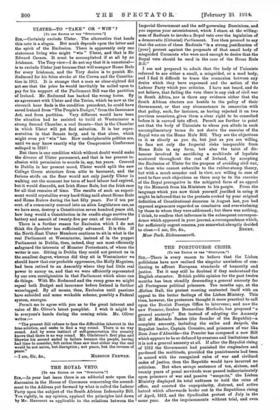THE ROYAL VETO.
fin no SOROS Or TINE "Brsorarown Sin,—In your hut issue there is an editorial note upon the discussion in the House of Commons concerning the amend- ment to the Address put forward by what is called the Labour Party upon the subject of the South African Indemnity Bill. You rightly, in my opinion, applaud the principles laid down by Mr. Harcourt as applicable to the relations between the
Imperial Government and the self-governing Dominions, and you express your astonishment, which I share. at the willing- ness of Radicals to invoke a Royal veto over the legislation of a democratic: (Colonial) Parliament. You then proceed to say that the action of these Radicals "is a strong justification of [your] protest against the proposals of that small body of misguided Unionists who were mad enough to desire that the Royal veto should be used in the case of the Home Rule
I am not prepared to admit that the body of Unionists referred to are either a small, a misguided, or a mad body, and I find it difficult to trace the connexion between any desire which they have expressed and the action of the Labour Party which you criticize. I have not heard, and do not believe, that failing the veto there is any risk of civil war in South Africa, nor is there any evidence either that the South African electors are hostile to the policy of their Government, or that any circumstance in connexion with that policy, such, for instance, as having rejected it on two previous occasions, gives them a clear right to be consulted before it in carried into effect. Permit ins further to point out that the body of Unionists to whom you allude in such uncomplimentary terms do not desire the exercise of the Royal veto on the Home Rule Bill. They see the objections to it as clearly as you do, but just as you are willing to face not only the Imperial risks inseparable from Home Rule in any form, but also the taint of dis- honour involved in sacrificing a multitude of loyalists scattered throughout the rest of Ireland, by accepting the Exclusion of Ulster for the purpose of avoiding civil war, so those who cannot subscribe to the rubber-stamp theory, but with a much sounder end in view, are willing in case of need to face such objections as there may be to the exercise of the Royal prerogative in the mitigated form of an appeal by the Monarch from his Ministers to his people. From the language which you now think yourself justified in using it might be inferred that to the protests evoked by your original definition of Constitutional decorum in August last, you had opposed arguments regarded as conclusive and overwhelming by those to whom they were addressed ; but there was nothing, I think, to confirm that inference in the subsequent correspon- deuce which appeared in your journal, a correspondence which, for sufficiently cogent reasons, you somewhat abruptly decided
to close—I am, Sir, &a, EBURY. Moor Park, Rielananswortk.














































 Previous page
Previous page